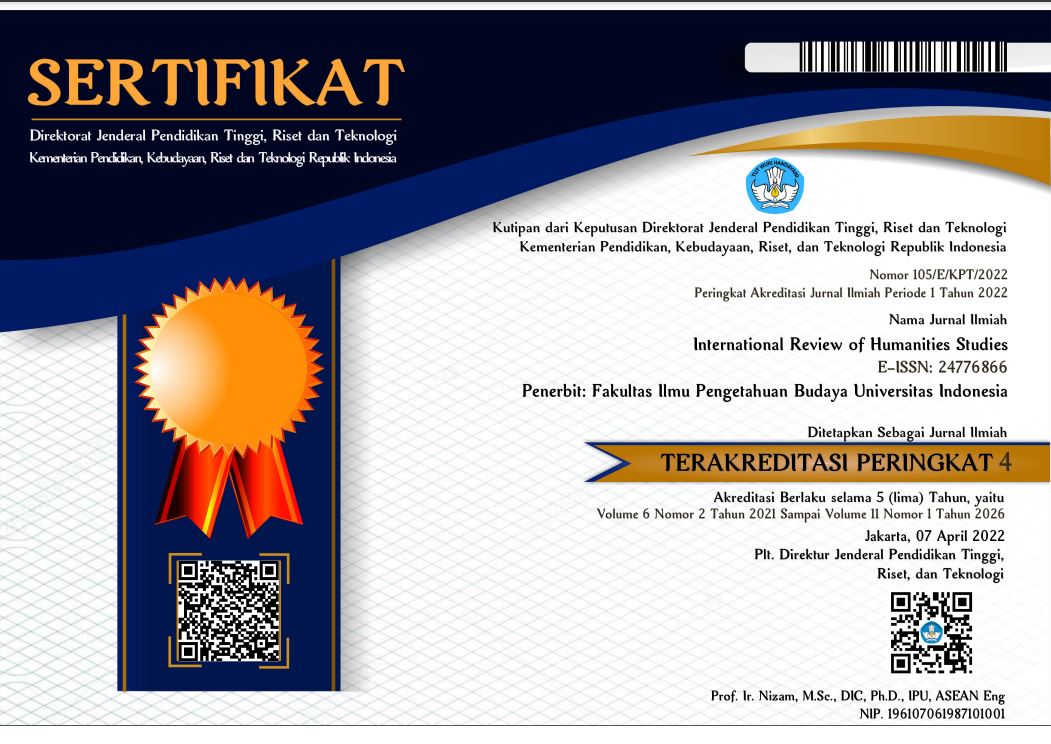International Review of Humanities Studies

Abstract
Slang is a language that is used daily and continues to grow due to the development of social media among fan communities. Each fan community has used slang specific to their interests, one of them being the K-Pop fandom. Despite the international growth of the K-Pop fandom and the spread of its cultural influence over recent years, there has been a lack of discussion on the linguistic aspect of its community, on the slang generated and used by its fan community in particular. Therefore, this research aims to expound on how K-Pop fandom slang words found in the drama ‘Her Private Life’ are formed. The study based its theoretical framework on the National Institute of Korean Language’s (2014) classification of new words in Korean based on its word-formation process. Out of the 24 slang words analyzed from the drama ‘Her Private Life’, there are 3 slang words in the form of a single word and 21 slang words in the form of a complex word. In the case of single-word form slang words, all 3 are created through the borrowing process; while complex-word form slang words are mostly created through the blending process, equating to 9 words in total.
References
Ahn, H., & Kiaer, J. (2020). Pop culture words: How can K-Wave turn Korean words into global, translingual words? English Today, 1-10.
Ayto, J., & Simpson, J. A. (2010). The oxford dictionary of modern slang. Oxford University Press.
D., & Lee, C. (2013). Language online: Investigating digital texts and practices. Routledge.
Chaer, A. (2008). Morfologi bahasa indonesia: Pendekatan Proses, Jakarta: Rineka Cipta.
Duffett, M. (2015). Understanding fandom: An introduction to the study of media fan culture. Bloomsbury Academic.
Fuhr, M. (2017). Globalization and popular music in south korea: Sounding out k-pop. Routledge.
Habtay, T. A. (2017). A Study on Contents of Korean Culture Education through Neologism. S-Space SNU Open Repository and Archive.
Jang, J. (2019). A Study on the Morphological, Semantic and Sociolinguistic Characteristics of Korean-English Blended Words. Chonnam National University Graduate School.
Jang, K. (2011). The Principles in the Formation of Neologism-Collocations. Seoul National University Journal of Humanities, 66, 269–297.
Kim, E. (2016). Anglicized Korean Neologisms of the New Millennium: An Overview. English Today, 32(3), 52-60.
Lee, A. (2019). Il-ko? Deok-ming-a-us? ‘Geu-nyeo-ui sa-saeng-hwal’ deok-hu yong-eo sa-jeon gong-gae [Ilko? Deok-mingaus? Revealing ‘Her Private Life’ Fandom Terms Dictionary]. Joongang Daily, Joongang Daily, [Online] Available: https://news.joins.com/article/23432580. (Feb 16, 2020)
Lee, I., Lee, S., & Chae, W. (1997). 한국의 언어 [Hangug-ui eoneo]. Seoul: Shingu Munhwasa.
Lee, J. (2019) u-ri-mal top-a-bo-gi ‘jjin-i-da’ [Familiarizing Korean ‘Jjinida’]. Hankook Ilbo, Hankook Ilbo, [Online] Available: https://www.hankookilbo.com/News/Read/201911071084717361 (Mar 20, 2020)
Lee, S. (2016) A Study on Monosyllabic Clipped Words in New Words. URIMALGEUL: The Korean Language and Literature, 70, 49-71.
Merriam-Webster. (n.d.). Merriam-Webster.com dictionary. [Online] Available: https://www.merriam-webster.com/dictionary/ (Mar 12, 2020)
National Institute of Korean Language. (2014). 2014 New Words. National Institute of Korean Language. [Online] Available: https://www.korean.go.kr/front/reportData/reportDataView.do?mn_id=207&report_seq=801&pageIndex=1 (Mar 15, 2020)
National Institute of Korean Language. (n.d.). 우리말샘 [Urimalsaem]. National Institute of Korean Language. [Online] Available: https://opendict.korean.go.kr/dictionary/ (Mar 9, 2020)
National Institute of Korean Language. (n.d.). Romanization of Korean. [Online] Available:
https://www.korean.go.kr/front_eng/roman/roman_01.do (Mar 20, 2020)
Naver Corporation. (n.d.). NAVER Hanja dictionary. Naver Corporation. [Online] Available: https://ko.dict.naver.com/ (Mar 9, 2020)
Roig-Marín, A. (2016). Anglicisms in Music Fandom Terminology: The Idiosyncratic Use of Self-Referential Nouns in the Language of Youth. Atlantis, 38(2), 181-199.
Suhardi, B., & Sembiring, B. C. (2009). “Aspek Sosial Bahasa”. In Lauder, M. R. M. T., Yuwono, U., & Kushartanti. Pesona bahasa: Langkah awal memahami linguistik (pp. 47–64).
Jakarta: PT Gramedia Pustaka Utama.
Ulandari, M. (2018). Bahasa Slang Dalam Komunitas Hallyu Wave. Universitas Negeri Surabaya, 5(1).
Yu, M. (2017). A Study on the Educational Method of Word Formation of Newly-coined Words in Education of Korean Language. Sejong University Graduate School.
Recommended Citation
Megarani, Shandina and Dini, Jelita
(2021)
"AN ANALYSIS ON K-POP FANDOM SLANG WORD-FORMATION IN THE DRAMA ‘HER PRIVATE LIFE’,"
International Review of Humanities Studies: Vol. 6:
No.
3, Article 7.
DOI: 10.7454/irhs.v6i3.1334
Available at:
https://scholarhub.ui.ac.id/irhs/vol6/iss3/7
Included in
Anthropology Commons, Art and Design Commons, Creative Writing Commons, Cultural Heritage Law Commons, Education Law Commons, Film and Media Studies Commons, History Commons, Intellectual Property Law Commons, International and Area Studies Commons, Legal Writing and Research Commons, Linguistics Commons, Museum Studies Commons, Philosophy Commons, Urban Studies and Planning Commons


